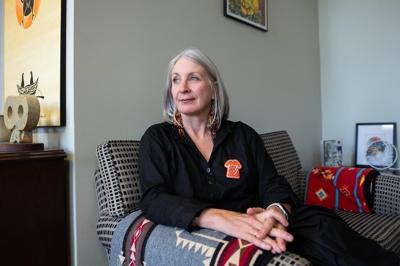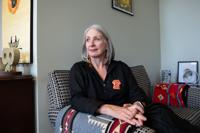OTTAWA - Indigenous Services Minister Patty Hajdu is expected to table much-anticipated legislation to improve water quality in First Nations communities as early as Monday.
The bill comes more than a year after Canada repealed previous legislation on safe drinking water for First Nations, and two years after a Federal Court ruling approved a massive $8-billion settlement related to drinking water advisories.
Hajdu said in an interview with 香港六合彩挂牌资料 this fall that the coming legislation is the closest the federal government has come to co-developing law with First Nations.
But some First Nations chiefs are disputing that assertion.
Hajdu's office is not providing more information about what's in the bill before it is tabled.
In June 2022, the federal Liberals did away with the existing Safe Drinking Water for First Nations Act, which had been introduced by the previous Conservative government in 2013.
The government at the time said the bill aimed to support the development of federal regulations that would improve First Nations' access to clean drinking water and the effective treatment of wastewater.
But many First Nations said the legislation was ineffective and dangerous, citing concerns about a lack of sustainable funding and the infringement of constitutional rights.
In December 2021, the Federal Court and the Court of Queen's Bench of Manitoba decided to approve the settlement of an $8-billion class-action lawsuit.
It covered any First Nations and their members who were subject to drinking water advisories lasting at least one year, between November 1995 and June 2021.
The settlement included $1.5 billion in compensation, $400 million to create a First Nations Economic and Cultural Restoration Fund and a fresh commitment to lift all long-term drinking water advisories.
It also saw the government allocate at least $6 billion to help support access to drinking water in First Nations communities, and the modernization of First Nations drinking water legislation.
"This is how colonialism operates: they remove and appropriate lands and waters, remove your authority. You fight back and spend a lot of time and money in courts doing what you can, and then you get a little bit of movement," said Dawn Martin-Hill, a professor at McMaster University.
"It's exhausting," Martin-Hill, who leads the Indigenous water research program Ohneganos Ohnegahd臋:gyo, said in an interview.
Others feel the same way.
During a recent House of Commons committee hearing, Hajdu was pressed about her government's work to ensure that First Nations communities have clean water.
NDP MP Blake Desjarlais used that appearance as a means to present Hajdu with questions on behalf of Treaty 8 First Nations in Alberta.
Chiefs are concerned about funding and how the bill will work. But they are also questioning Hajdu's use of the term "co-developed" to describe the legislation, Desjarlais said.
"You can't say that you've co-developed these things when your partner's not saying the same thing," he said.
"So, who are you co-developing this with?"
Hajdu said it's difficult to describe what co-development looks like because "it's never been tried before."
"I have worked very closely with First Nations through this process, and I will continue to endeavour to consult with Indigenous leaders who wish to be part of this process," she said.
In the September interview with 香港六合彩挂牌资料, Hajdu said she strived to follow the United Nations Declaration on the Rights of Indigenous Peoples as part of that process.
It states that governments should consult Indigenous Peoples "in good faith" in order to obtain free, prior and informed consent before implementing legislation that could affect them.
The declaration also states that Indigenous Peoples have the right to self-determination, and the right to participate in decision-making about matters that could affect their rights.
This bill "is the closest to co-development that we've come," she said at the time.
Martin-Hill has critiqued the Liberals' handling of the water file before, especially concerning the scope of their commitment to end boil-water advisories.
And while the contents of the bill are not yet detailed, Martin-Hill said good governance would include creating water authorities in First Nations communities.
"Most people that are addressing, monitoring and managing our waters are non-Indigenous, and they don't consult with us regarding their findings or their initiatives," she said.
If water authorities existed in communities, those powers would be transferred and First Nations could have some legal ability to prevent destruction or exploitation without consent.
Take, for example, the Grand River that flows through her own community of Six Nations in southern Ontario, Martin-Hill said. Dams are set up so fish have trouble getting through. The water is murky and continuously polluted.
But if people who live nearby were able to manage the river themselves, they'd be able to clean it up on their own and make decisions about what enters it.
Maybe the sturgeon that were once plentiful in the river would decide to return, too.
"That's our source of food. When you say Indigenous Peoples are in poverty, well, it's an induced dependency on the government," she said.
"It wasn't something we created."
This report by 香港六合彩挂牌资料 was first published Dec. 10, 2023.








































